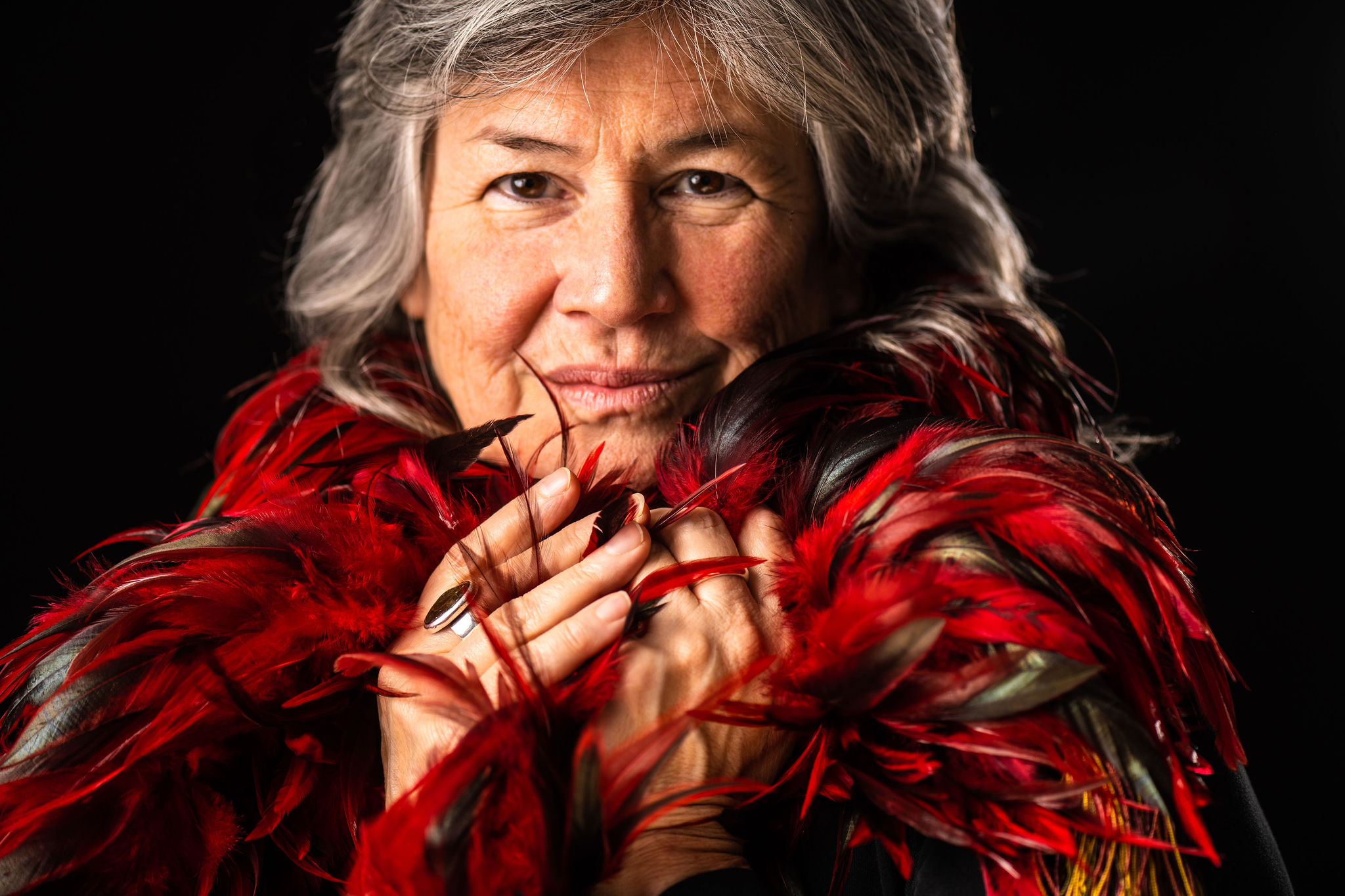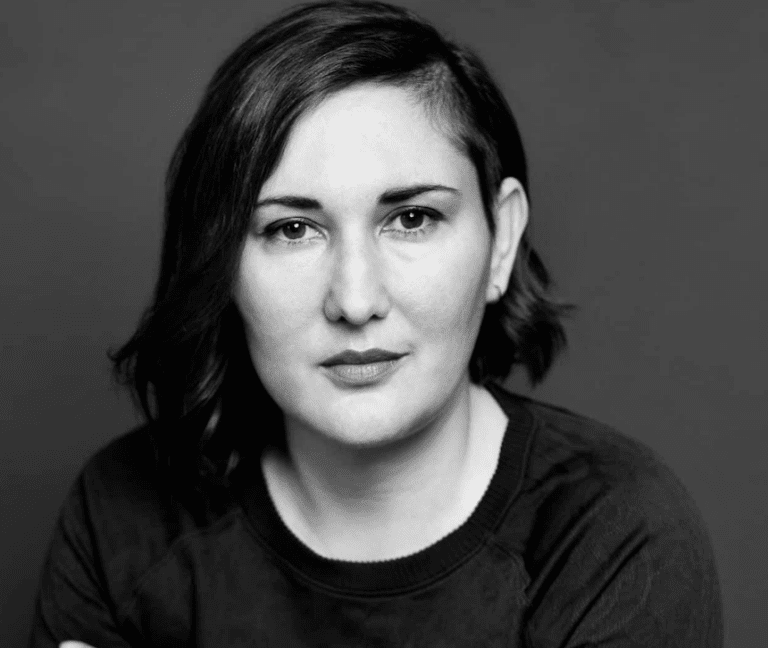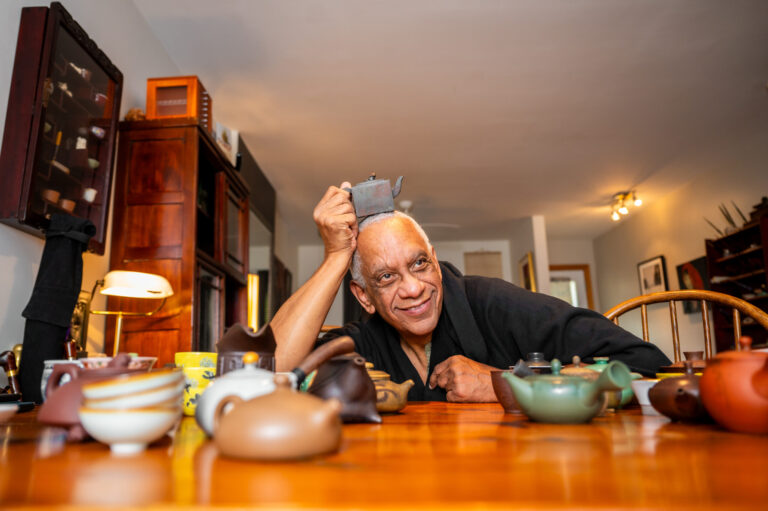Spotlight: Yvette Nolan
Yvette Nolan is ready for the end of the world.
“I’m an apocalyptist,” she told me over the phone.
“I don’t believe in this world. I don’t see how we can pull ourselves back from the brink. Human beings are greedy, and not mindful, and the only way I can think about making the world better is by getting rid of a lot of it.”
While it may well be that Nolan is ready for the end — in whatever form such a thing might take — she’s spent her life creating the intangible. A born storyteller, Nolan is a playwright and director whose parallel life as an arts administrator has touched the lives of innumerable theatre artists across Canada — folks like Nina Lee Aquino, Tara Beagan, Craig Lauzon, and Donna-Michelle St. Bernard, who Nolan hired as her general manager at Native Earth Performing Arts “a million years ago.”
“She taught me how to be a general manager,” said St. Bernard, whose play The First Stone Nolan continues to direct as it tours across Canada. “It was life-changing. Career-changing. Everything-changing.
“One of my favourite things she’s taught me is to stay in my own lane. When you hire people to do work, you have to let them do that work. Don’t help — sometimes, your help is not helpful. Let people be amazing at what they’re amazing at.”
One of my favourite things Yvette has taught me is to stay in my own lane. When you hire people to do work, you have to let them do that work.
Donna-Michelle St. Bernard
Nolan’s life as a “theatre rat,” as she calls herself, began in Winnipeg, where she moved with her family after being born to an Algonquin mother and Irish father in Prince Albert, Saskatchewan. Nolan’s parents met while her mother was placed in a residential school in Kenora — her father was a mathematics teacher there. When Nolan’s mother graduated, the school gave them a wedding. The family left the area soon after.
“My connection to Prince Albert is really minimal,” Nolan said. “We moved around.”
In Winnipeg, Nolan discovered her passion for the arts — to the chagrin of her parents.
“They gave me all the things they would have wanted — ballet lessons, piano lessons, theatre school — and I thought I was going to be an actor,” she said. “And they were like ‘no, no, we just gave you that to be a well-rounded person, you should be something serious.’ But once you’re a theatre rat, you’re kind of a theatre rat,” she continued, laughing.
When Nolan attended the University of Manitoba, it was to study English and French, ostensibly to steer clear of a theatre career.
“But by the time I got my undergrad, I was working professionally in theatre,” she said. “I was stage managing. I was doing dance floors, hanging lights. Really anything to stay in the theatre. And I’ve been doing that ever since.”

Once Nolan entered the theatre world, she knew she would do anything to stay there. She started writing plays for the Winnipeg Fringe Festival while she was working there as an assistant.
“Looking at the Fringe plays, I thought, really, truly, ‘I can do better than that.’ And that’s when I really started writing plays.
“And it’s hard,” she said. “It took me twenty years to write The Unplugging. It’s a practice, which is also the great thing. Theatre is a practice — you have to practice all the time, which I love, because I love it when I’m learning.”
And that love of learning has perhaps been nurtured by a lifetime of cross-country moves — it seems she never sits still. When Nolan and I spoke, she was in Saskatoon following a month and a half in Stratford, and when we hung up, she had upcoming trips to BC, Toronto, and Ottawa.
But perpetual motion is nothing new for Nolan.
“While I lived in Winnipeg, I went up to Yukon for a writer’s festival, to be the playwright and to be the Indigenous playwright. And I fell in love with both the land and a human being,” said Nolan. “I went for five days and ended up staying for five years.”
Theatre is a practice — you have to practice all the time.
After Yukon came some time in Nova Scotia, then a decade in Toronto for Nolan’s time as artistic director at Native Earth, then Saskatoon.
“I think [moving around so much] is part of being deracinated,” she said. “I was never connected to my mother’s community. I’m an urban Aboriginal. So I’m connected to Aboriginal communities in different places. My elders are all over the place.
“You assemble the life that you can,” she continued. “I’m connected not to one specific place on this land, but to many places, to all of it.”
And those many places across Canada have served as sites for the ongoing process that is reconciliation.
“We’re talking reconciliation now,” she said. “And that means there’s awareness of a problem. But I don’t know if people like each other anymore.
“Since I’ve been here in Saskatoon, I’ve worked with Joel [Bernbaum] and Lance [Knight] on Reasonable Doubt, which is about race relations here between Indigenous and non-Indigenous people. We were in the middle of doing that as a verbatim piece when Colten Boushie was killed.”
Boushie died on February 9, 2018, allegedly murdered by Gerald Stanley, a white farmer, in rural Saskatchewan. Stanley was acquitted of murder and manslaughter in the following trial, to much controversy.
“We incorporated trial transcripts, then put [Reasonable Doubt] on for this community and people, and it was pretty tough,” said Nolan. “It was just the truth that spoke about how hurt and angry and scared people were of each other. And it made for more interesting theatre, for sure. But reconciliation — we don’t know what that means.”
Attitudes towards reconciliation are similarly complex across the country. But the conversations differ slightly from place to place. “Because,” said Nolan, “populations and the makeup of the communities are different in Toronto, or Nova Scotia, or British Columbia.”

The ongoing process of reconciliation affects theatre, too, of course, including some of Canadian theatre’s more colonial traditions — like theatre criticism.
In 2020, Nolan wrote about her experiences with “obtuse, ignorant, dismissive reviews” for CBC, echoing points she previously made about reviews in her 2015 book Medicine Shows. In the CBC article, she wrote about Yolanda Bonnell’s production of bug at Theatre Passe Muraille. Only reviewers who were Black, Indigenous, or people of colour were invited to review, a move which caused controversy in Toronto and beyond.
“Theatre is a discussion between an artist and an audience,” wrote Nolan for CBC. “We have to sit together in the same room and breathe each other’s air, witness another’s experience and maybe be transformed by it. Whatever barriers exist to that shared experience must be dismantled. Perhaps that time is now.”
“This is part of the change we’re in, too,” added Nolan in our interview. “Who has the power? Who are the speakers? And have they been taught? What have they been taught about theatre? They’ve been taught theatre has a certain shape, a certain look. And then they come to review Indigenous theatre, or Black theatre, or Asian theatre, and it doesn’t have the same shape or look as what they know — so how do they review it?
“I don’t think we really have critics. We have reviewers. And there’s a difference. Like, what is your job? My job is to tell a story of this community in such a way that it’s trying to touch another community — whether that’s a mainstream community or Indigenous community or theatregoing community, whatever, that’s my job. That’s what I’m doing. I’m doing the best of my ability. Now, what’s your job? As a so-called theatre critic? What’s your actual job? What do you think you’re doing?
“Things are changing,” continued Nolan. “It’s complicated, We’re in a complicated moment. We’re stumbling towards reconciliation.”
Over the next two months, the Great Canadian Theatre Company (GCTC) in Ottawa will put on a sort of “mini-season” of Nolan’s work — The Unplugging, which she wrote, set in a post-apocalyptic future and imbued with Indigenous tradition and spirituality, and St. Bernard’s The First Stone, about child slavery in Uganda, which Nolan directs.
“It’s accidental,” Nolan said. “And it’s magical.” Incidentally, both The Unplugging and The First Stone have roots at Native Earth in Toronto — in separate interviews, Nolan and St. Bernard both remembered working on the plays in between other administrative work.
“It wasn’t necessarily on purpose,” agreed Sarah Kitz, artistic director of GCTC. “It’s obviously not a problem. Yvette is a truly remarkable artist, and we’re so privileged to have her unique touch on two of the shows in our season. And I’m very excited for GCTC audiences to receive these wildly different shows which have her as a centre creative artist.”

Like St. Bernard, Kitz has looked to Nolan for guidance on arts administration at key points throughout her career. “I had some conversations with her about leadership prior to my time at GCTC,” she said. “And I saw the Toronto production of The Unplugging, and I really loved the script. It’s so generous. And so female. It’s so matriarchal. And it’s so patient.
“When I think about this play, not only do I think Yvette is prophetic as a writer, but that frequently, when we look at post-apocalyptic genre writing, it’s absolutely bleak, and Yvette gives us hope. And a reasonable way forward. And I think we need that so badly right now,” she said.
“The Unplugging is about aging, and my role as a woman, and traditional knowledge,” said Nolan. “My mum was taken from her community when she was seven, and she never really got back to her community full-time, which meant she lost connection to the things she was learning.
“In The Unplugging, they talk about snaring a rabbit. I learned that from my mother — she taught me how to make a snare. But she hadn’t made a snare since she was seven years old. And I don’t know if she ever actually did it — she talked me through what happens when you catch the rabbit, and how you skin the rabbit. I realized how much I’ve lost connection to where I come from — I have to learn these things from my mother, who was disconnected from her community in Quebec, while I was growing up in Winnipeg.
“In the event of the end of the world, those are the things we know: what we can eat, and how to catch a rabbit, and how to stay alive, and how to stay warm. All those things. And they’re all in the piece for me.”
In the event of the end of the world, these are the things we know: what we can eat, and how to catch a rabbit, and how to stay alive, and how to stay warm. And those are all in The Unplugging.
For Nolan, her work in the theatre often comes back to the end of the world — when and what it might be, and how we might navigate it.
“So then what happens?,” she asked. “How do we build back better? How do we come back from an apocalypse in a way that is not greedy and arrogant? That became The Unplugging,” she said.
“A decade later, we’re in the middle of a pandemic. I’m sitting at home looking at the television and watching. And it’s amazing. We’re watching the whole country have the unplugging…it’s like we’re not even listening to what we know.
“We Indigenous folks have been undergoing a slow-motion, long-term apocalypse for 500 years,” she said.

But for Nolan, even with the certainty of impending doom, there’s joy, too, a joy which crops up frequently in The First Stone. The play features music, dance, and choral performance to demonstrate the community harmed by child slavery in west Africa. The piece makes use of both darkness and light.
“The world is hard,” said Nolan. “But there’s joy. What’s the joy? Why do we bother going on? There have to be things that pay off. So it’s community, and dancing, and singing.
“Throughout it all, there has to be joy.”










Comments